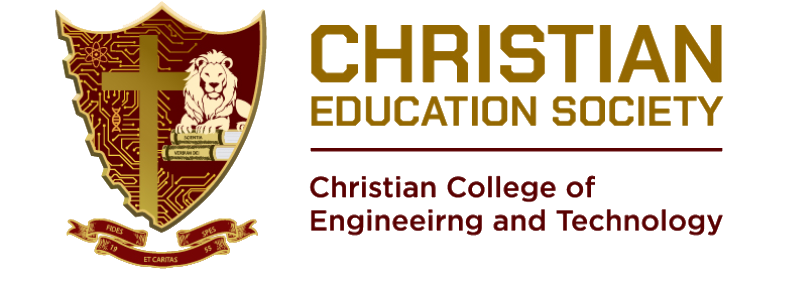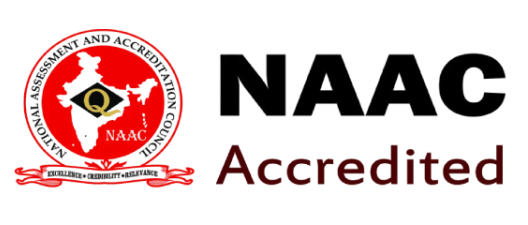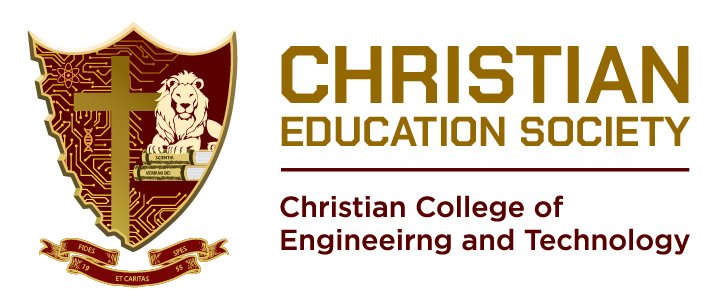Christian College of Engineering and Technology



of Excellence

Christian College Of Engineering and Technology
(Approved By AICTE, New Delhi | Affiliated To Anna University, Chennai )
Near Checkpost, Dindigul Road, Oddanchatram – 624 619, Dindigul (Dist), Tamilnadu



M.E Power Electronics & Drives
Introduction
With ever growing technology, advanced courses are required to support electrical engineering graduate study. Power electronics is a cutting-edge technology that is widely utilized in the desalination of plants, in vehicle painting, in the testing of rail cars, and in the production of power units for aerospace, marine, and automotive systems.
M.E in Power Electronics and Drives in CCET was introduced in 2013 with an intake of 24 students under the department of Electrical and Electronics Engineering, is a 2-Year post-graduation programme which is divided into 4 semesters of six months each. The Programme also covers advanced topics in microprocessors and microcontrollers which are very much needed for today’s Power Electronics engineer. The objective of this Programme is to focus on quality learning environment in power electronic devices, circuits and electric drives to support the application fields of Power Systems, Renewable Systems, Electric Vehicles, HVDC Transmission and Industrial Engineering. It involves an in-depth study of power electronic devices, their application, design, and principles involved in their operation. The various courses in this Programme also compares some of the conventional power electronic devices with modern devices. The lab facilities are well established, so as to provide the students industrial exposure and to encourage the students to design, analyze and create prototype models for the various technologies which can build strong society. Students in our programme receive training in this area and so they can design specialized power electronic solutions for diverse industrial sectors. Students are assigned projects in various domains in Power Electronics for their Phase I and Phase II projects as per the curriculum, which they execute within the campus and convert them into research articles for publications in reputed National/International Journals/Conferences. This post is sponsored by our partners.
Vision
To emerge as a Centre of Excellence in Power electronics and drives through innovation and teamwork.
Mission
To provide a platform in acquiring knowledge in the field of Power electronics and drives with highest quality in technical education, research and services to the society.
Welcome to the M.E. Power Electronics and Drives Programme,
The department’s goal is to train competent engineers with a worldwide perspective to keep up with the fast-changing technological landscape. The department has signed Memorandums of Understanding (MoU) with reputable organizations so as to provide exposure to the students with cutting-edge technologies. The infrastructure and lab facilities are renovated on a regular basis, providing ample chances for postgraduate students to learn and innovate. The course provides in-depth knowledge of power electronics equipment design, manufacture, control, and testing. The Department has qualified faculty members with strong academic credentials. The faculty’s intellectual strength is reflected in the graduates, many of whom are at the pinnacle of industry and academia in India and internationally. Another focus area of the department is research. Our faculty and students are actively engaged in research and working to publish articles in peer reviewed International Journals and Conferences.
I am confident that the department’s students will uphold the department’s reputation by demonstrating a high degree of professional competence in their respective fields.
My best wishes to all graduates !!!
TOTAL NO. OF SEATS : 24
PROGRAMME EDUCATIONAL OBJECTIVES (PEOs):
PEO1: To prepare the students for successful career in power electronic industry, research and teaching institutions.
PEO2: To analyze, design and develop the power electronic converter/drive systems.
PEO3: To develop the ability to analyze the dynamics in power electronic converters/drives systems and design various controllers to meet the performance criteria.
PEO4: To design power electronic systems and special electrical machines for efficient extraction and utilization of various renewable energy sources.
PEO5: To promote student awareness for the lifelong learning and to introduce them to professional ethics.
PROGRAMME OUTCOMES (POs)
| PO# | Programme Outcomes |
1 | An ability to independently carry out research/investigation and development work to solve practical problems. |
2 | An ability to write and present a substantial technical report/document. |
3 | Students should be able to demonstrate a degree of mastery over the area as per the specialization of the program. The mastery should be at a level higher than the requirements in the appropriate bachelor program. |
4 | Apply knowledge of basic science and engineering in design and testing of power electronic systems and drives. |
5 | Interact with Industry in a professional and ethical manner to meet the requirements of societal needs and to contribute sustainable development of the society. |
6 | Implement cost effective and cutting edge technologies in power electronics and drives system. |
COURSE OUTCOMES [CO]
| MA4106 -APPLIED MATHEMATICS FOR POWER ELECTRONICS ENGINEERS – [C101] | ||
| C101.1 | Able to apply the concepts of matrix theory in Electrical Engineering problems. | |
| C101.2 | Able to solve boundary value problems associated with engineering applications. | |
| C101.3 | Able to solve problems using Laplace transform associated with engineering applications. | |
| C101.4 | Use the effective mathematical tools for the solutions of partial differential equations by using Z transform techniques for discrete time systems. | |
| C101.5 | Able to solve problems using Fourier series associated with engineering applications. | |
| PX4101- ANALYSIS OF ELECTRICAL MACHINES – [C102] | ||
| C102.1 | Understand the principles of electromechanical energy conversion and characteristics of DC motors | |
| C102.2 | Know the concepts related with AC machines and modeling of ‘n’ phase machines | |
| C102.3 | Interpret the concepts of reference frame theory. | |
| C102.4 | Apply procedures to develop induction machine model in both machine variable form and reference variable forms | |
| C102.5 | Follow the procedures to develop synchronous machine model in machine variables form and reference variable form. | |
| PX4151 -ANALYSIS OF POWER CONVERTERS – [C103] | ||
| C103.1 | Acquire and apply knowledge of mathematics in power converter analysis | |
| C103.2 | Model, analyze and understand power electronic systems and equipment. | |
| C103.3 | Formulate, design and simulate phase controlled rectifiers for generic load and for machine loads | |
| C103.4 | Design and simulate switched mode inverters for generic load and for machine loads | |
| C103.5 | Select device and calculate performance parameters of power converters under various operating modes | |
| PX4102- MODELING AND DESIGN OF SMPS – [C104] | ||
| C104.1 | Analyse and design Non-Isolated DC-DC converter | |
| C104.2 | Analyse and design Isolated DC-DC converter | |
| C104.3 | Derive transfer function of different converters | |
| C104.4 | Design controllers for DC-DC converters | |
| C104.5 | Design magnetics for SMPS application | |
| RM4151 – RESEARCH METHODOLOGY AND IPR – [C105] | ||
| C105.1 | Formulate research problem. | |
| C105.2 | Analyze literature review and find research gaps to finalize research objectives. | |
| C105.3 | Identify the need of ethics in research. | |
| C105.4 | Identify the need of IPR of research projects for economic growth and social benefits. | |
| C105.5 | Apply basic data analytics techniques: probability distribution, linear regression, ANOVA | |
| PX4001 – POWER SEMICONDUCTOR DEVICES – [C106] | ||
| C106.1 | Identification of suitable device for the application. | |
| C106.2 | Know the advantages of Silicon Carbide devices and Galium Nitride devices. | |
| C106.3 | Understand the principles and characteristics of Silicon devices, Silicon Carbide devices and Galium Nitride devices. | |
| C106.4 | Design proper driving circuits and protection circuits. | |
| C106.5 | Construct a proper thermal protective device for power semiconductor devices | |
| PX4161 – POWER CONVERTERS LABORATORY – [C107] | ||
| C107.1 | Comprehensive understanding on the switching behaviour of Power Electronic Switches | |
| C107.2 | Comprehensive understanding on mathematical modeling of power electronic system and ability to implement the same using simulation tools | |
| C107.3 | Ability of the student to use arduino/microcontroller for power electronic applications | |
| C107.4 | Ability of the student to design and simulate various topologies of inverters and analyze their harmonic spectrum | |
| C107.5 | Ability to design and fabricate the gate drive power converter circuits. | |
| C107.6 | Analyze the three-phase controlled rectifiers and isolated DC-DC converters for designing the power supplies | |
| PX4111 – ANALOG AND DIGITAL CONTROLLERS FOR PE CONVERTERS LABORATORY – [C108] | ||
| C108.1 | Identification of suitable analog and digital controller for the converter design. | |
| C108.2 | Know the advantages of gate driver, sensing and protection circuits in power converters. | |
| C108.3 | Hands on with different controller with strategies for design. | |
| C108.4 | Design and testing the proper driving circuits and protection circuits. | |
| C108.5 | Fabrication of analog and digital controllers for various real time applications. | |
| PX4201 – ANALYSIS OF ELECTRICAL DRIVES – [C109] | ||
| C109.1 | Ability to acquire and apply knowledge of mathematics and converter/machine dynamics in Electrical engineering. | |
| C109.2 | Ability to formulate, design, simulate power supplies for generic load and for machine loads. | |
| C109.3 | Ability to analyze, comprehend, design and simulate direct current motor based adjustable speed drives. | |
| C109.4 | Ability to analyze, comprehend, design and simulate induction motor based adjustable speed drives. | |
| C109.5 | Ability to design a closed loop motor drive system with controllers for the current and speed control operations. | |
| PX4202- SPECIAL ELECTRICAL MACHINES – [C110] | ||
| C110.1 | Know the concepts related with stepper motor. | |
| C110.2 | Understand the working and various characteristics of switched reluctance machines. | |
| C110.3 | Study the working principle and characteristics of permanent magnet brushless DC motors. | |
| C110.4 | Know the construction, working principles and characteristics of permanent magnet synchronous motor and synchronous reluctance motor. | |
| C110.5 | Understand the features of axial flux machines in comparison with radial flux machines and to know the principles of axial flux machines. | |
| PX4291 – ELECTRIC VEHICLES AND POWER MANAGEMENT – [C111] | ||
| C111.1 | Apply the concept of testing of hypothesis for small and large samples in real life problems. | |
| C111.2 | Apply the basic concepts of classifications of design of experiments in the field of agriculture. | |
| C111.3 | Appreciate the numerical techniques of interpolation in various intervals and apply the numerical techniques of differentiation and integration for engineering problems. | |
| C111.4 | Understand the knowledge of various techniques and methods for solving first and second order ordinary differential equations. | |
| C111.5 | Solve the partial and ordinary differential equations with initial and boundary conditions by using certain techniques with engineering applications. | |
| PX4005 – POWER ELECTRONICS FOR RENEWABLE ENERGY SYSTEMS – [C112] | ||
| C112.1 | Analyze the impacts of renewable energy technologies on the environment and demonstrate them to harness electrical power. | |
| C112.2 | Select a suitable Electrical machine for Wind Energy Conversion Systems. | |
| C112.3 | Design the power converters such as AC-DC, DC-DC, and AC-AC converters for Solar energy systems. | |
| C112.4 | Design the power converters such as AC-DC, DC-DC, and AC-AC converters for Wind energy systems. | |
| C112.5 | Interpret the stand-alone, grid-connected, and hybrid renewable energy systems with MPPT. | |
| PS4072 – ENERGY STORAGE TECHNOLOGIES – [C113] | ||
| C113.1 | Understand the physics of energy storage | |
| C113.2 | Model the different energy technologies. | |
| C113.3 | Recognize the applications of various techniques. | |
| C113.4 | Design and analyze the energy storage technologies. | |
| C113.5 | Select and apply the appropriate technique based on the application. | |
| PX4211 – POWER ELECTRONICS AND DRIVES LABORATORY – [C114] | ||
| C114.1 | Ability to construct the simulation circuit for the closed loop control of drive systems | |
| C114.2 | Ability to formulate, design the speed controller for DC motor-based drive system. | |
| C114.3 | Ability to conduct load tests in an electrical drive system. | |
| C114.4 | Ability to formulate, design the speed controller for AC motor-based drive system. | |
| C114.5 | Ability to design the control algorithm for the control of an electrical drive using Microcontroller and Digital signal processor. | |
| PX4212 –DESIGN LABORATORY FOR POWER ELECTRONICS SYSTEMS – [C115] | ||
| C115.1 | Ability to independently carryout research and development work in power converters | |
| C115.2 | Ability to demonstrate a degree of mastery over the design and fabrication of switching regulators. | |
| C115.3 | Ability to apply conceptual basis required for design and testing of various | |
| C115.4 | Ability to interact with industry to take up problem of societal importance as Mini project designed. | |
| C115.5 | : Ability to compare different possible solution to the same practical problem. | |
| PX4012 – RENEWABLE ENERGY TECHNOLOGY – [C201] | ||
| C201.1 | Demonstrate the need for renewable energy sources | |
| C201.2 | Develop a stand-alone photo voltaic system and implement a maximum power point tracking in the PV system. | |
| C201.3 | Design a stand-alone and Grid connected PV system. | |
| C201.4 | Analyze the different configurations of the wind energy conversion systems. | |
| C201.5 | Realize the basic of various available renewable energy sources | |
| PX4013 – WIND ENERGY CONVERSION SYSTEM – [C202] | ||
| C202.1 | Attain knowledge on the basic concepts of Wind energy conversion system. | |
| C202.2 | Attain the knowledge of the mathematical 53odeling and control of the Wind turbine | |
| C202.3 | Develop more understanding on the design of Fixed speed system | |
| C202.4 | Study about the need of Variable speed system and its 53odeling. | |
| C202.5 | Learn about Grid integration issues and current practices of wind interconnections with power system. | |
| OME432 – ENERGY CONSERVATION AND MANAGEMENT IN DOMESTIC SECTORS – [C203] | ||
| C203.1 | Understand technical aspects of energy conservation scenario. | |
| C203.2 | Energy audit in any type for domestic buildings and suggest the conservation measures. | |
| C203.3 | Perform building load estimates and design the energy efficient landscape system. | |
| C203.4 | Gain knowledge to utilize an appliance/device sustainably. | |
| C203.5 | Understand the status and current technological advancement in energy storage field. | |
| PX4311 -PROJECT WORK I – [C204] | ||
| C204.1 | Ability to identify, formulate, design, interprete, analyze and provide solutions to complex engineering and societal issues by applying knowledge gained on basics of science and Engineering. | |
| C204.2 | Ability to choose, conduct and demonstrate a sound technical knowledge of their selected project topics in the field of power components, protection, high voltage, electronics, process automation, power electronics and drives instrumentation and control by exploring suitable engineering and IT tools. | |
| C204.3 | Ability to understand, formulate and propose new learning algorithms to solve engineering and societal problems of moderate complexity through multidisciplinary projects understanding commitment towards sustainable development. | |
| C204.4 | Ability to demonstrate, prepare reports, communicate and work in a team as a Member / leader by adhering to ethical responsibilities. | |
| C204.5 | Ability to acknowledge the value of continuing education for oneself and to stay up with technology advancements | |
| PX4411 – PROJECT WORK II – [C205] | ||
| C205.1 | Ability to identify, formulate, design, interpret, analyze and provide solutions to complex engineering and societal issues by applying knowledge gained on basics of science and Engineering. | |
| C205.2 | Ability to choose, conduct and demonstrate a sound technical knowledge of their selected project topics in the field of power components, protection, high voltage, electronics, process automation, power electronics and drives instrumentation and control by exploring suitable engineering and IT tools. | |
| C205.3 | Ability to understand, formulate and propose new learning algorithms to solve engineering and societal problems of moderate complexity through multidisciplinary projects understanding commitment towards sustainable development. | |
| C205.4 | Ability to demonstrate, prepare reports, communicate and work in a team as a Member / leader by adhering to ethical responsibilities. | |
| C205.5 | Ability to acknowledge the value of continuing education for oneself and to stay up with technology advancements | |


